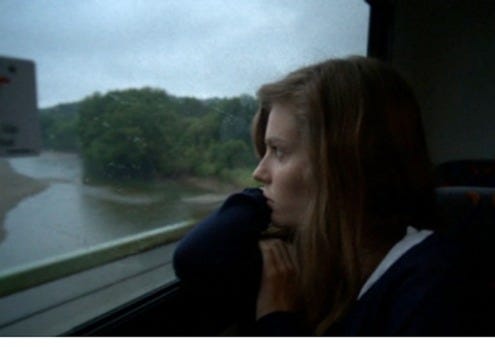Hannah Fidell, "We're Glad You're Here"

Hannah Fidell's valentine to Bloomington, Ind., "We're Glad You're Here," is also a valentine to twentysomething post-grads leaping into the job market and finding it hardly deep enough to even qualify as a wading pool.
A native of Bethesda, Maryland, a current resident of Austin, Texas, and a 2007 Indiana University grad — "I even had one of those IU cheerleader outfits with the red and white pompoms when I was 8 or 9; I think my parents still have it somewhere" — talks about "We're Glad You're Here" as filling a hole in the independent-film scene, her film as a feminist experiment and life imitating art.
Can you talk a little about what sparked your interest in making this film?
I began writing this film on an airplane coming back to New York (where I was living at the time; I'm now living in Austin, Texas) from South By Southwest in 2009. I had seen Kris Swanberg's "It Was Great But I Was Ready to Come Home" and was blown away — such a simple film about female friendship that I couldn't stop thinking about. I was also working at a production company and writing a lot on the side with a group of other recent film-school grads, so seeing "It Was Great" gave me the confidence that I needed to just go out and make "We're Glad You're Here." I also thought it would be a lot easier than it turned out to be. I was completely naive.
Your main character, Catherine, is sort of at a crossroads as the film is beginning. Can you tell us about her, where she is at this point in her life?
Catherine returns to Bloomington after being laid off from her job at an ad agency in New York. I don't think she's looking for anything in particular other than a place where she can figure out her next move. New York can be a great place to live, but it can be really hard, too. I obviously based Catherine on how I was feeling at the time — living in a tiny apartment, commuting into Manhattan on a train that breaks down every morning, being an assistant at a commercial production company and still not being able to make enough to live on. And then you have Bloomington, the exact opposite of all that. At the time when we made "We're Glad You're Here," a lot of my friends were still living in Bloomington, but they kept talking about how they couldn't wait to get out and move to New York. I thought that was interesting.
Can you talk a little about making a movie in Indiana? Did you encounter any obstacles, or did you find everyone welcoming and accepting of your work?
Shooting in Indiana was fantastic! We never encountered any problems, and, in fact, everyone was just really excited to help.
Going back to Bloomington, then, was kind of life imitating art, then? Very meta.
Bloomington is such a special place. I guess it was life imitating art. I made the film and subconsciously just wanted to do what the protagonist had done: Go back to Bloomington, a place that really couldn't stay the same as it was in college but still was the antithesis of living in New York. I actually ended up spending a month there housesitting for my aunt and uncle last summer under the premise of "writing the next film," which I did. In fact, I just shot it this past spring and must say that I'm incredibly proud of it! But I also just spent a lot of time hanging out with friends and going swimming every day.
You talk a bit in your notes for the film about feminism and how your movie is, in many ways, a response to the ongoing sexism of even independent film. How do you feel your film answers this sexism?
There are so few female directors in narrative film. I thought it would be an interesting angle to see if having a female writer, director, cinematographer and editor (as well as protagonist) made any difference to the way that the film is shaped and shot. I think when it came down to it, it didn't make any difference. We're all taught how to read film the same way. Some film theorists believe it to be in a masculine way. I think at the time I ended up being concerned with just making something that made sense. If I tried to do this experiment now, having had a few more films under my belt and being much more confident with my own ability as a director, it would probably turn into something much more experimental, perhaps something like Carolee Schneeman's "Fuses." That would be awesome.
Another thing you discussed is the recession and how it has affected this generation of young people. Can you discuss how you captured that in your film?
The film was made at the height of the economic collapse. Everyone I knew in New York was scared that they were going to lose their jobs. A lot of them did. Recent graduates are going to be the first ones to go. Period. And it's terrifying when you're told you could lose your job any day. I'm sure this played a part in my decision to make the film, too. I had a lot of friends who felt like you follow the rules, go to college, move to the city, get a decent job and then you're stuck on unemployment for months waiting to find something, anything, so you don't have to move back in with your parents. I hope I was able to capture that anxiety, that feeling of losing control and wanting to get it back. At least that's what I tried to do with the film.


